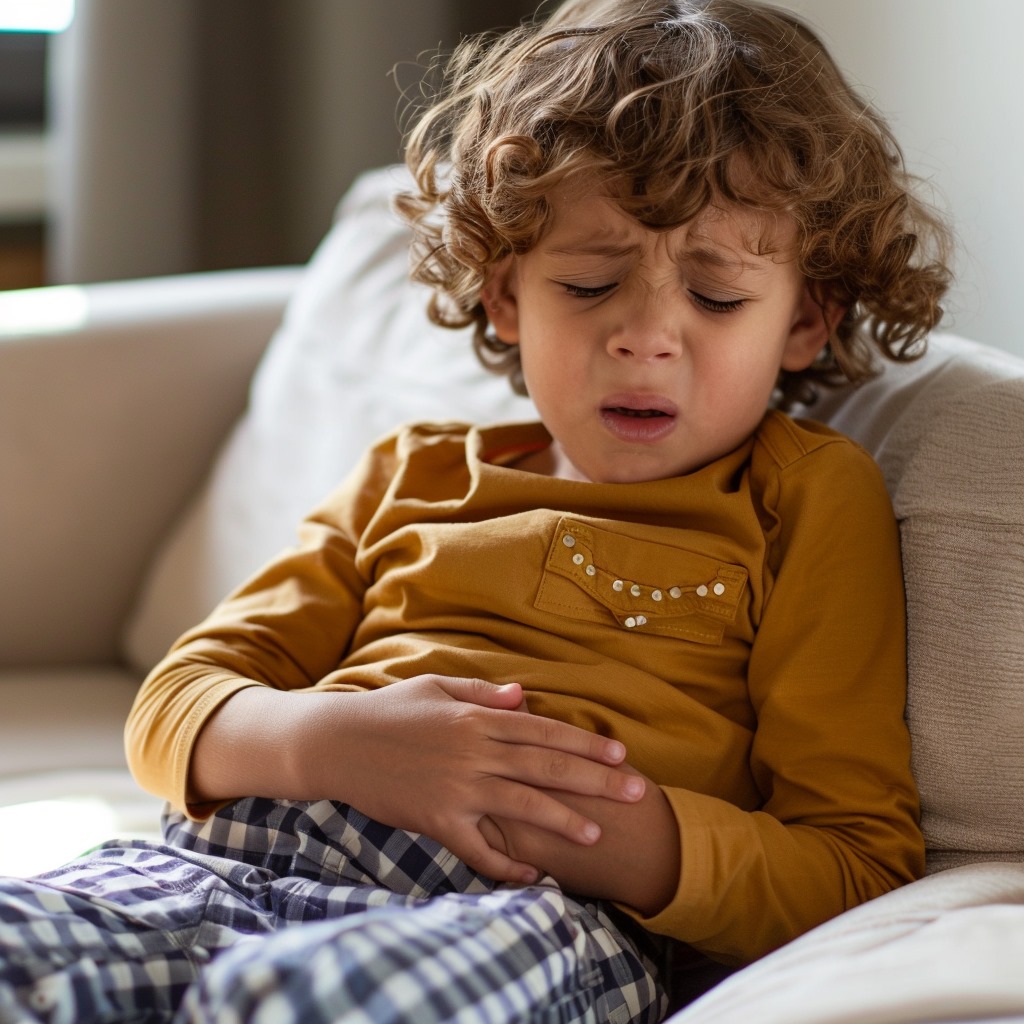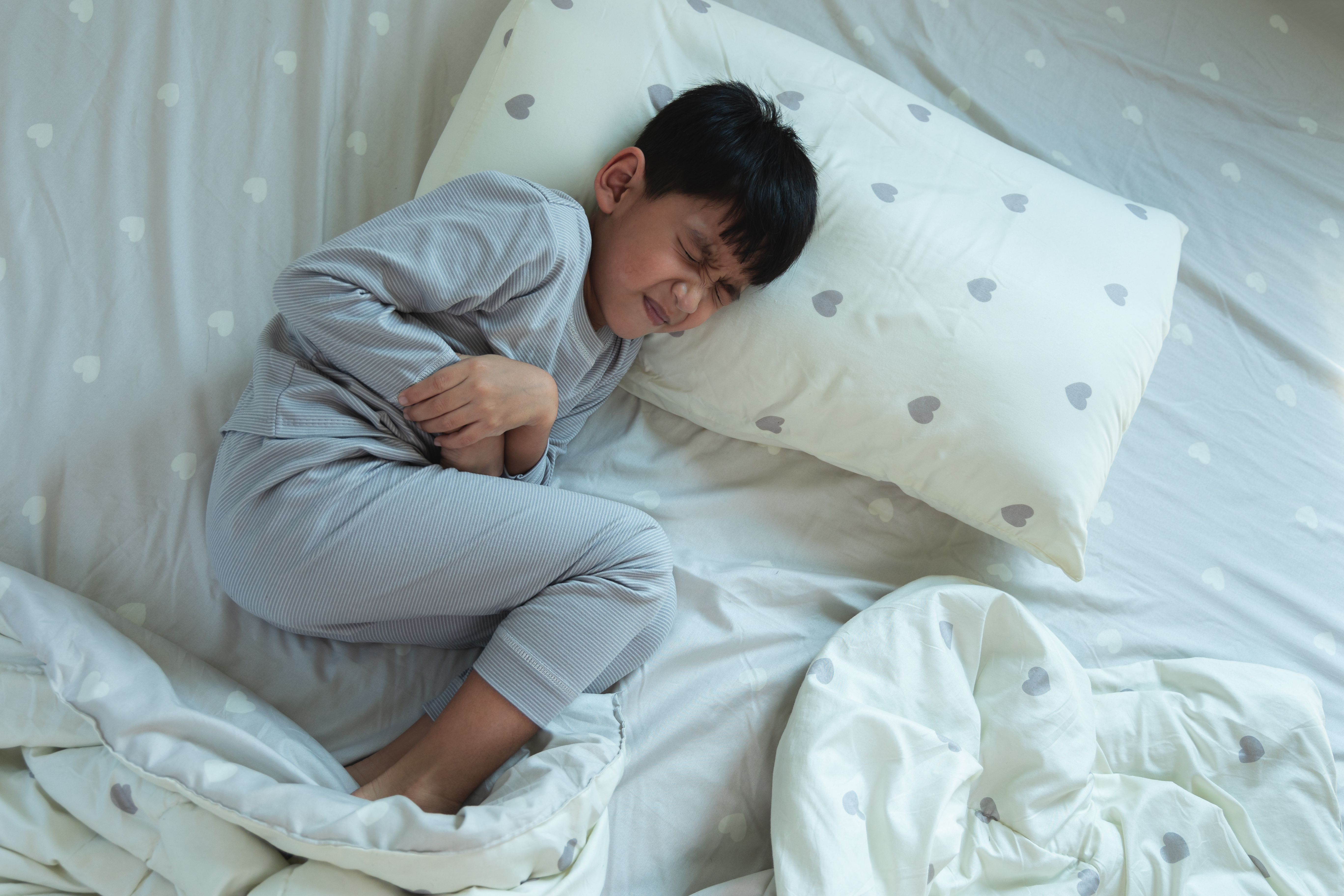Child with abomdinal pain

Stomach pain in children can be caused by various factors, such as constipation, stress (the intestines are sensitive to it), stomach flu, urinary tract infection (UTI), diarrhea in children, and even chest pain in children.
If your child often experiences stomach pain without an infection, constipation, or allergy, it's referred to as functional abdominal pain. This pain is often related to busyness, stress, and concerns.
Stomach pain in children can result from many things, including specific foods, inflammation, constipation, allergy, stress, or anxiety. Often, no specific illness or condition can be identified, but the intestines may react to exciting events. Busy schedules, stress, and worries create tension in the intestines, causing some children, especially those sensitive to it, to experience stomach pain. About 1 in 10 children regularly suffer from stomach pain, with girls more frequently affected than boys. In over half of the children with stomach pain, a physical examination reveals no clear abnormalities explaining the complaints, while other children have identifiable causes.

Now, let's explore why abominal pain happens among children. Below are common causes described of stomach / abdominal pain in children
Functional abdominal pain (no apparent causes)
Functional abdominal pain (pain without constipation, inflammation, or allergy) is common in children. It's not a sign of a digestive disease. Children's intestines can be highly sensitive to changes in their bodies during puberty, certain medications, anxiety, sadness, or stress.
- Constipation: Pain may occur anywhere in the abdomen, and your child may only have bowel movements 1 or 2 times a week.
- Stress: Pain may result from tensions at home or school. If your child worries about the pain, it can sometimes worsen. Parental anxiety, tension, or sadness can also trigger abdominal issues in children, as can violence and abuse.
- Stomach flu: Your child may experience nausea, vomiting, diarrhea, and diarrhea in children usually resolves on its own within a week.
- UTI (Urinary Tract Infection): Causes pain in the lower abdomen, painful urination, and may include blood in the urine. Girls may get a urinary tract infection after sex.
- Gastric irritation: Pain is located in the upper abdomen and often caused by excessive, fatty, or highly spiced foods, as well as soda, chocolate, peppermint, smoking, and medications (such as painkillers like ibuprofen).
- Appendicitis: Mainly occurs in teenagers. Pain is usually in the lower right abdomen, intensifying rapidly in 1 to 2 days. Your child may also feel nauseous and unwell. Contact your doctor or the emergency room with these symptoms.
If you need more information, or you want to learn more about these different causes, you can always contact one of our MIA doctors for advice.
- Infections: Infections like ear or lung infections, occasionally causing stomach pain in 3 to 5-year-olds.
- Onset of menstruation: Especially in girls aged 11 to 14.
- Sensitivity to specific foods: A child consistently experiences symptoms after eating certain foods like milk, peanuts, eggs, spicy food or gluten (celiac disease).
- Psychological issues: Such as anxiety disorders
- Intestinal twisting: Also called volvulus in medical terms. Volvulus is fortunately a rare occurrence.

Recognizing urgent symptoms is crucial in children.
If your child's stomach pain persists, worsens, or they become ill with continuous vomiting, weight loss, or more than 6 episodes of watery diarrhea for 3 days, consult your doctor. Seek immediate attention for diarrhea with fever lasting 3 days, or if accompanied by constant vomiting, minimal fluid intake, excessive thirst, or no improvement after a week.
For children under 2, contact the same day if your child becomes silent, pale, breathes rapidly, has over 6 episodes of diarrhea on the first day, fever on the first day with diarrhea, consistent vomiting without retaining liquids, or no urination for 8-12 hours.
- your child continues to cry persistently and cannot be comforted.
- your child hasn't urinated for 24 hours.
- your child is drowsy or confused.
- there is clear pain when pressing on the lower right side of the abdomen.
- your child experiences chest pain and is is persistent